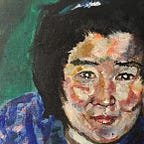When Life Goes Back to Normal
even sparrows behave unexpectedly
I sat on a patio of a small cafe in the historic Distillery District in Toronto, enjoying my first breakfast in a public place after a pandemic. Nothing could spoil the sweet taste of freedom in my mouth, and it didn't matter that while the latte was delicious, the walnut tart was cold and stale. Across the street, the main building of a once-booming Canadian distillery profited greatly from American prohibition, stood sombre and quiet as a reminder that times always change. After war comes peace, prosperity turns into shambles, and so on it goes.
A baby sparrow, bright-eyed and peppy, came out of nowhere and landed on my table. He chirped and hopped, his little claws tapping on the table, oblivious to the first lesson any wild creature should've learned of how treacherous humans are. This unexpected trust has melted my heart, making me feel generous and mighty. I nipped a crumb off my tart and threw it at his feet. The crumb was too big for the youngster, so he crushed it to pieces with his beak. Two more sparrows joined the feast. They were hopping on the table, casting demanding looks at me and not afraid for a moment that I could do them harm.
After feeding them for a while, I finally had enough. My hermit pandemic self became overwhelmed by being crowded even by such small creatures as sparrows. I wrapped the rest of the tart into a napkin and raised my arm to scare the sparrows off. They didn’t move. I moved both my hands in a distinct shooing gesture. The youngster sparrow flew off the edge of the table, not because I managed to scare him off, but because he saw a pigeon exploring a garbage bin nearby. The other two sparrows stayed glued to the table. The smallest of the two, which was supposed to be full, looked at me and tapped on the table with his beak, clearly asking for a top-up.
“Shoo,” I said, somehow feeling guilty for breaking the party. “Go away.”
The sparrows hopped closer, flanking me from both sides.
“Shoo,” I cried histerically, stuffing my face with the rest of the tart.
Few crumbs escaped me and fell on the table. The sparrows chirped delightedly and attacked them at once. The third sparrow came flying and landed on the table, his small claws screeching on the surface. All three of them hopped all over the table in search of crumbs, not paying any attention to me. I sat on the edge of my stool, shooing them with the napkin, not realizing that more crumbs were falling, exciting the birds. I felt like a soldier on the battlefield, waving a white flag of surrender under the onslaught of a superior force.
I left the patio in a state of confusion, something primal awakening inside my brain. While humanity was stuck in quarantine, the new breed of urban fauna had come to life, questioning the natural order of things. These youngsters considered a city a safe place and didn’t flee at the slightest movement of a human hand. Remembering this defeat, I will surely come more prepared next time. I will not allow any sparrows to invade my space from the beginning. I will be firm but fair. There will be no more dirty little feet anywhere near my food. And the proper order will be restored. People will be the mainstay in the city once again, and all other species will fade out.
The anger I felt seemed so disproportionate to the event that it stopped me in my tracks. Since when I became a person to believe that humans were more precious than any other species? Since forever, the small voice in my head had replied, taking me back to the day when my fifteen years son caught a fly in the room and released it from the balcony.
“You should've killed it,” I said.
“Why?”
“There are too many flies. And they transmit diseases.”
“There are many people as well,” my son said, “and I’m not sure, that humans spread less infection.”
The world felt different when I came back from the short trip down memory lane. This past year left us painfully aware of globally spread diseases. Many other creatures moved in the places we deemed ours in a world slowly coming back from this pandemic. Is it too much to ask for a new wave of human invasion to be more lenient and gentle to wildlife? Perhaps, the next time I encounter sparrows, I would find a way to share the space in a mutually inclusive way.
